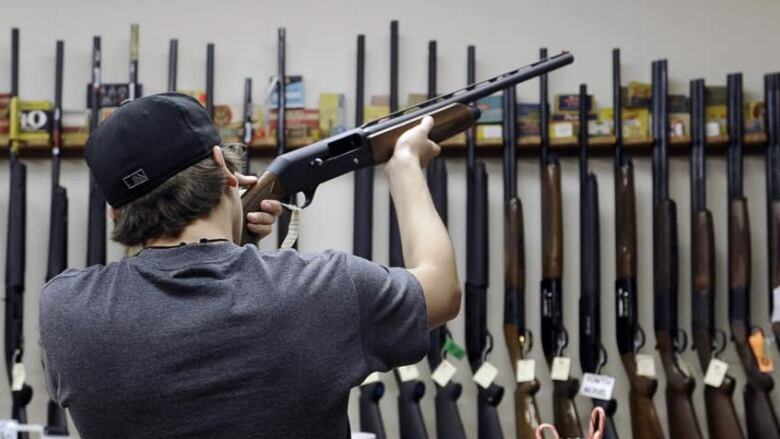Tighter gun rules urged by judge in Okotoks fatality inquiry
Unarmed man with multiple firearms in his home was shot and killed by RCMP in 2010

A fatality inquiry judge is calling for stricter reviews of gun licence applications after a southern Alberta man with a history of mental problems was fatally shot by police.
Corey Lewis, 39, was shot outside his Okotoks home in July 2010 after a standoff with an RCMP tactical team.
He was found holding a dark-coloured umbrella that he had pointed at officers, who thought the object was a weapon.
Lacking 'diligence and common sense'
Provincial court Judge Marlene Graham says she finds it disturbing that Lewis was granted licences for five firearms, including restricted weapons, despite his mental problems, a suicide attempt and a previous emergency protection order.
"I do find that Mr. Lewis's possession of the five long-barreled guns was an integral part of the event leading up to his death," Graham wrote in a report released Monday.
- MORE LOCAL NEWS |Group wearing masks force their way into S.E. Calgary home with weapons
- MORE LOCAL NEWS |'I could see blood in the alley,' says neighbour after N.E. shooting
"I find that the screening process used to grant the gun licences to Mr. Lewis lacked diligence and common sense and gives me no assurance that public safety, which is the purpose of the Firearms Act, was being sufficiently emphasized throughout the process."
Graham recommends better screening for firearms licence applicants, including a telephone interview with the applicant's spouse.
She also recommends that police consult with mental-health professionals when dealing with armed people in standoffs to help get them to surrender.
'Angry and distraught'
The report says that in the hours before he was shot, Lewis was angry and distraught.
After knocking his wife down and punching his stepson, Lewis's family fled the house, contacted RCMP and told the Mounties that he was in the bedroom with five guns and ammunition.

Some officers entered the house but quickly retreated when Lewis confronted them holding a shotgun.
RCMP called in a tactical team of 20, including a sniper, to surround the house.
After hours of trying to contact him by telephone, Lewis came out of the house in the dark, hunched over with his arms bent. A Mountie shone a light on Lewis and police thought the umbrella he was holding was a weapon. Officers opened fire.
Homicide
Mounties found a bloodstained document under his body with the words "Take My Life" printed on one side.
The other side said: "I am gone but know this RCMP entering a residence with guns drawn is an ACT of WAR!!!!!"
During the inquiry, Barry Benkendorf, lawyer for the RCMP, said Lewis caused officers to shoot him. The lawyer called it a case of "suicide by cop."
Graham ruled the death a homicide.
Widow Naydene Lewis said she is pleased overall with the report and its recommendations. But she wishes RCMP had used more lighting around the house and had contacted her husband's mental-health providers.
"Corey made a choice. Personally I think it was a medically induced choice because he was on several different medications for his mental health," she said in an interview.
"Ultimately the police did their job. So I don't begrudge them."
Mental health checks
The report notes that Daniel Magotiaux, Alberta's chief firearms officer, testified that a policy change was made last year to require a medical check of gun licence applicants if there is a mental health concern.
But Graham wrote that the officer also testified that despite the change, the licence for a restricted weapon would still be granted today because Naydene Lewis had signed her husband's application and hadn't filed a complaint.
Graham wrote this policy places undue responsibility on the applicant's spouse.
The chief firearms officer, who is a Mountie, was not immediately available for comment.
Fatality inquiries don't assess blame but make recommendations on how to avoid similar deaths.
On a mobile device? See the report here.












_(720p).jpg)


 OFFICIAL HD MUSIC VIDEO.jpg)
.jpg)



























































































